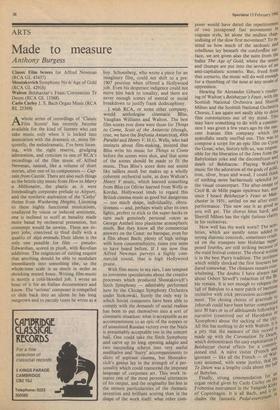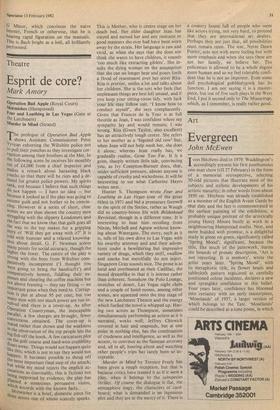ARTS
Made to measure
Anthony Burgess
Carlo Curley J. S. Bach Organ Music (RCA RL 25369) Awhole series of recordings of 'Classic Film Scores' has recently become available for the kind of listener who can take music only when it is locked into association with the dramatic or, more fre- quently, the melodramatic. I've been listen- ing, with the right reserve, grudging admiration, and cynicism to one of RCA's recordings of the film music of Alfred Newman, named, like a volume of short stories, after one of its components — Cap- tain from Castile. There are also such things as the brittle city music from How to Marry a Millionaire, the plastic as it were forebodingly corporate prelude to Airport, and the synthetic aspiration of the 'Cathy' theme from Wuthering Heights. Listening to these highly functional musications, unallayed by vision or induced sentiment, one is inclined to scoff at banality made more banal by orchestral pretension, but contempt would be unwise. These are ex- pert jobs, contrived to thud dully with a quality of déjà entendu.Their idiom is the only one possible for film — pseudo- Edwardian, scored in plush, with Ravelian additives. The exigencies of cutting require that anything should be able to modulate immediately into something else, so the whole-tone scale is as much in order as shrieking muted brass. Writing film-music is mostly a cold-blooded job. I wrote an hour of it for an Italian documentary and know. The 'serious' composer is compelled to slide back into an idiom he has long outgrown and to parody tunes he wrote as a
boy. Schoenberg, who wrote a piece for an imaginary film, could not shift to a pre- 1907 position when offered a Hollywood job. Even his desperate indigence could not move him back to tonality, and there are never enough scenes of mental or social breakdown to justify frank dodecaphony.
I wish RCA, or some other company, would anthologise cinematic Bliss, Vaughan Williams and Walton. The best film scores ever done were those for Things to Come, Scott of the Antarctic (though, true, we have the Sinfonia Antarctica), 49th Parallel and Henry V. H.G. Wells, who had instincts about film-making, insisted that Bliss write his music for Things to Come before the scenes were shot, and that some of the scenes should be made to fit the music. Thus Bliss's score does not sound like tailless mush but makes up a wholly coherent orchestral suite, as does Walton's Henry V music, which learned something from Bliss (or Olivier learned from Wells or (Gorda). Hollywood tends to regard this British cinema music as good but dangerous — too much shape, individuality, obtru- siveness — and, perhaps wisely after its own lights, prefers to stick to the super-hacks or turn such genuinely personal voices as George Antheil into plasticine atmospheric mush. But they know all the commercial answers on the Coast: no baroque, even for a film about Bach; plenty of high strings with horn countersubjects; tunes you seem to have heard before. If I say now that Alfred Newman purveys a highly com- mercial sound, that is high Hollywood praise.
With film music in my ears, I am tempted to irreverent speculations about the creative processes which produced Shostakovich's Sixth Symphony — admirably performed here by the Chicago Symphony Orchestra under Stokowski. Surely the only way in which Soviet composers have been able to comply with the demands of social realism has been to put themselves into a sort of cinematic situation: what is acceptable as an accompaniment to an epic of the steppes or of unassisted Russian victory over the Nazis is presumably acceptable too in the concert hall. One could take the Sixth Symphony and carve up its long opening adagio and two succeeding scherzi into very useful meditative and 'hurry' accompaniments to slices of aspirant cinema, but Shostako- vich's genius lay in the strength of a per- sonality which could transcend the imposed language of corporate art. This work re- mains one of the most personal utterances of his output, and the originality lies less in the minute particularities of the thematic invention and brilliant scoring than in the shape of the work itself: what other corn-
poser would have dared the repetitiveness of two juxtaposed fast movements in cognate style, let alone the endless rhap- sodising of the slow first movement? To re- mind us how much of the sardonic and rebellious lay beneath the conforniist sur- face, we are given also the suite from the ballet The Age of Gold, where the sneers and thumps are put into the service of an anti-capitalistic scenario. But, freed from that scenario, the music will do well enough for a thumbing of the nose at any mode Of oppression. Hearing Sir Alexander Gibson's render- ing of Walton's Belshazzar's Feast, with the Scottish National Orchestra and Sherrill Milnes and the Scottish National Orchestra Chorus, I am again not easily able to drive film connotations out of my mind. This may have something to do with a commis' sion I was given a few years ago by the nas- cent Iranian film company which the ayatollahs neatly snuffed out. This was 10 compose a script for an epic film on Cyrus the Great, who, history tells us, was respon- sible for the liberation of the Jews from the Babylonian yoke and the discomfiture and death of Belshazzar. Playing Walton's music for the adoration of the gods of gold, iron, silver, brass and wood, I could think of nothing more barbarously splendid for the visual counterpart. The after-image °J. Cecil B. de Mille pagan opulence has, ever since I heard Belshazzar's. Feast at Man" chester in 1931, settled on me after every performance. This new one is as good as you will get. The chorus bites hard, and Sherrill Milnes has the right furious claritY in his recitatives.
How well has the work worn? The acer- bities, which are mostly notes added to strong diatonic concords, sometimes crust' ed on the trumpets into Holstian suPer:. posed fourths, are still striking because or the staid festival context. The choral writing is in the best Parry tradition. The jazziness which mildly shocked the first listeners has dated somewhat. The climaxes remain over- whelming, The doubts I have always had about Osbert Sitwell's redaction of the 13i- ble remain. It is not enough to relegate the fall of Babylon to a mere patch of baritone recitative with trick percussion accompani- ment. The closing chorus of gratitude td, Jehovah could have been better compressed into 30 bars or so of alleluiando following a narrative (contrived out of Heroclotus °1, Xenophon) about the sacking of the city. All this has nothing to do with Walton. It !, a pity that the measure of this record is made up with the Coronation Te Delan:. which demonstrates the easy exploitation o Belshazzar choral effects for a coati-111_4 sioned end. A naive visitor{ French anr_ ignorant — like all the French — of Vi`,,,e ton) assumed, with some justice, that Te Deum was a lengthy coda about the 11
of Babylon. an
Finally, strong commendation for the organ recital given by Carlo Curley 0_,.11 rke Frobenius instrument in the Vangede ro of Copenhagen. It is all Bach, and it in eludes the fantastic Pedal-exercitiutn
Minor, which convinces the naive listener, French or otherwise, that he is hearing rapid figuration on the manuals. This is Bach bright as a bell, all brilliantly performed.











































 Previous page
Previous page